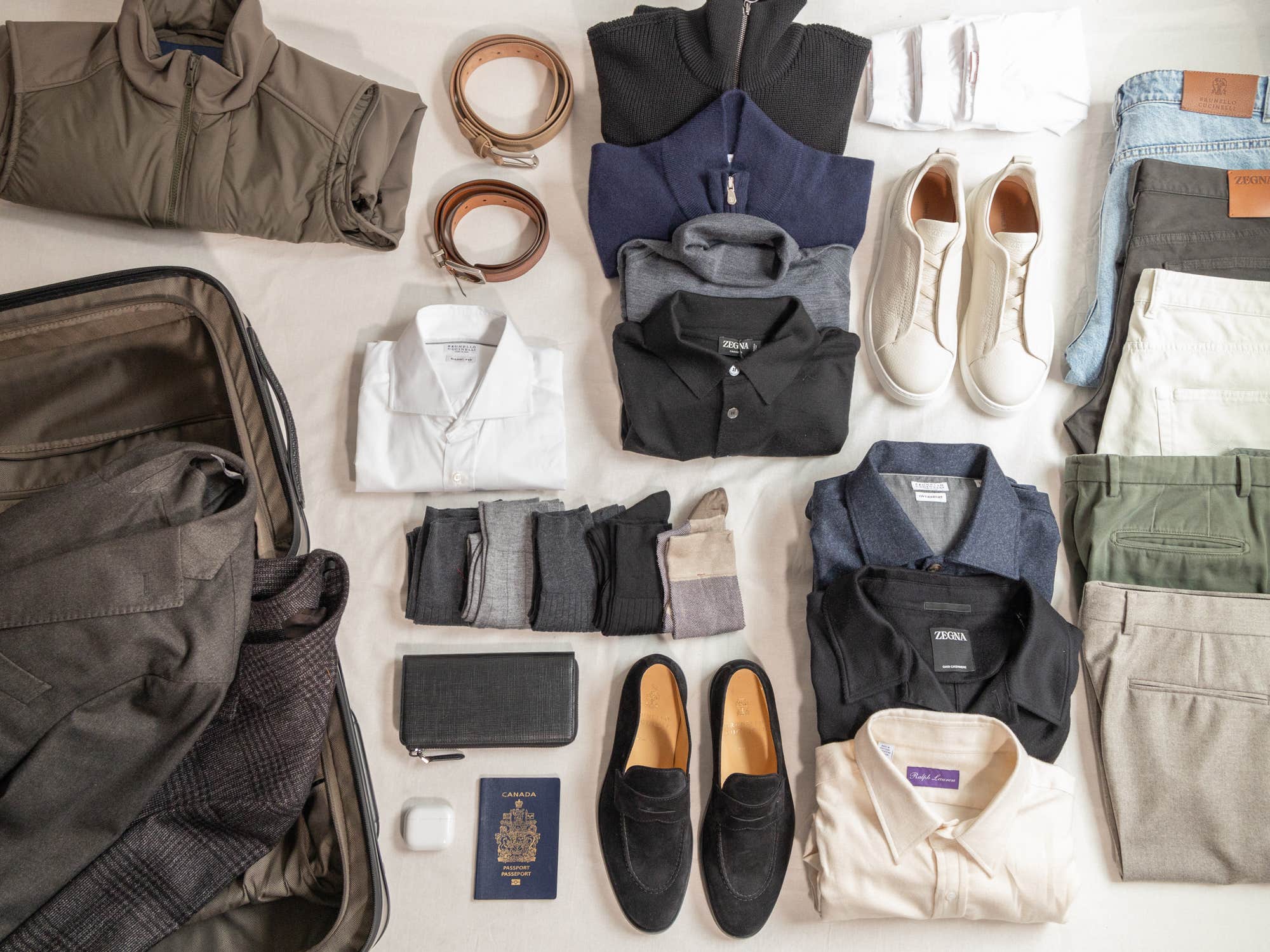
Your New Fool-Proof Packing Method
How Chad Fits a 2-Week, Cool-Weather European Trip into a Carry-on
How Chad Fits 2-Week, Cool-Weather European Trip into a Carry-on
Still checking a bag when you fly? It’s time to travel smarter.
There's nothing fun about checking luggage, you hold up your whole travel party while you wait at baggage claim, and you have to haul a giant bag to and from your accommodations. And that’s IF your bags actually make it to your destination. After several years of travelling to some of the world’s most stylish destinations, Chad Helm knows a thing or two about packing efficiently.
“Having to check a bag makes the trip more stressful for everyone. Don't be that guy holding everyone up at the baggage carousel” - Chad Helm
Sticking to a carry-on is easier than you might think, even for a cool-weather trip. So, if you’re continuously finding yourself worried about underpacking with only a carry-on, read on to see Chad’s fool-proof packing process for a 2-week fall/winter European business and leisure trip.
First, you have to know where you’re going and what you’re doing on your trip. Will you have business meetings? An important dinner? A conference? Is the forecast calling for rain? Start with the core outfits you know you’ll need, and build around that.
“Don’t overthink it. You don’t need to plan what to wear every day, and we all know you’ll only end up wearing half of what you bring. Make sure you've got the big events covered and the rest will fall into place.”
Lay all the items out on a bed first to plan out core looks, and then add in pieces that can mix and match for the rest of the trip. Most of the items in the bag should be multi-purpose.
Usually, Chad’s packing list includes:
- 1-2 Sport Jackets
- 1-2 Trousers and 1 Dress Belt
- 1 Suit and Tie (if needed)
- 2 White Dress Shirts
- 2 Pairs of Jeans
- 3-4 T-Shirts
- 2-3 Knitwear Pieces
- 1 Chunkier Sweater
- 1-2 Outerwear Pieces (wear 1 and pack 1)
- 3 Pairs of Shoes (wear 1 and pack 2)
- Socks and Underwear (pack extra)
- Loungewear for the hotel room
“This should be obvious, but don’t pack dirty clothes. Make sure you’ve got your outfits planned well enough in advance so you have time to hit the dry cleaners if needed.”
First, you have to know where you’re going and what you’re doing on your trip. Will you have business meetings? An important dinner? A conference? Is the forecast calling for rain? Start with the core outfits you know you’ll need, and build around that.
“Don’t overthink it. You don’t need to plan what to wear every day, and we all know you’ll only end up wearing half of what you bring. Make sure you've got the big events covered and the rest will fall into place.”
Lay all the items out on a bed first to plan out core looks, and then add in pieces that can mix and match for the rest of the trip. Most of the items in the bag should be multi-purpose.
Usually, Chad’s packing list includes:
- 1-2 Sport Jackets
- 1-2 Trousers and 1 Dress Belt
- 1 Suit and Tie (if needed)
- 2 White Dress Shirts
- 2 Pairs of Jeans
- 3-4 T-Shirts
- 2-3 Knitwear Pieces
- 1 Chunkier Sweater
- 1-2 Outerwear Pieces (wear 1 and pack 1)
- 3 Pairs of Shoes (wear 1 and pack 2)
- Socks and Underwear (pack extra)
- Loungewear for the hotel room
“This should be obvious, but don’t pack dirty clothes. Make sure you’ve got your outfits planned well enough in advance so you have time to hit the dry cleaners if needed.”
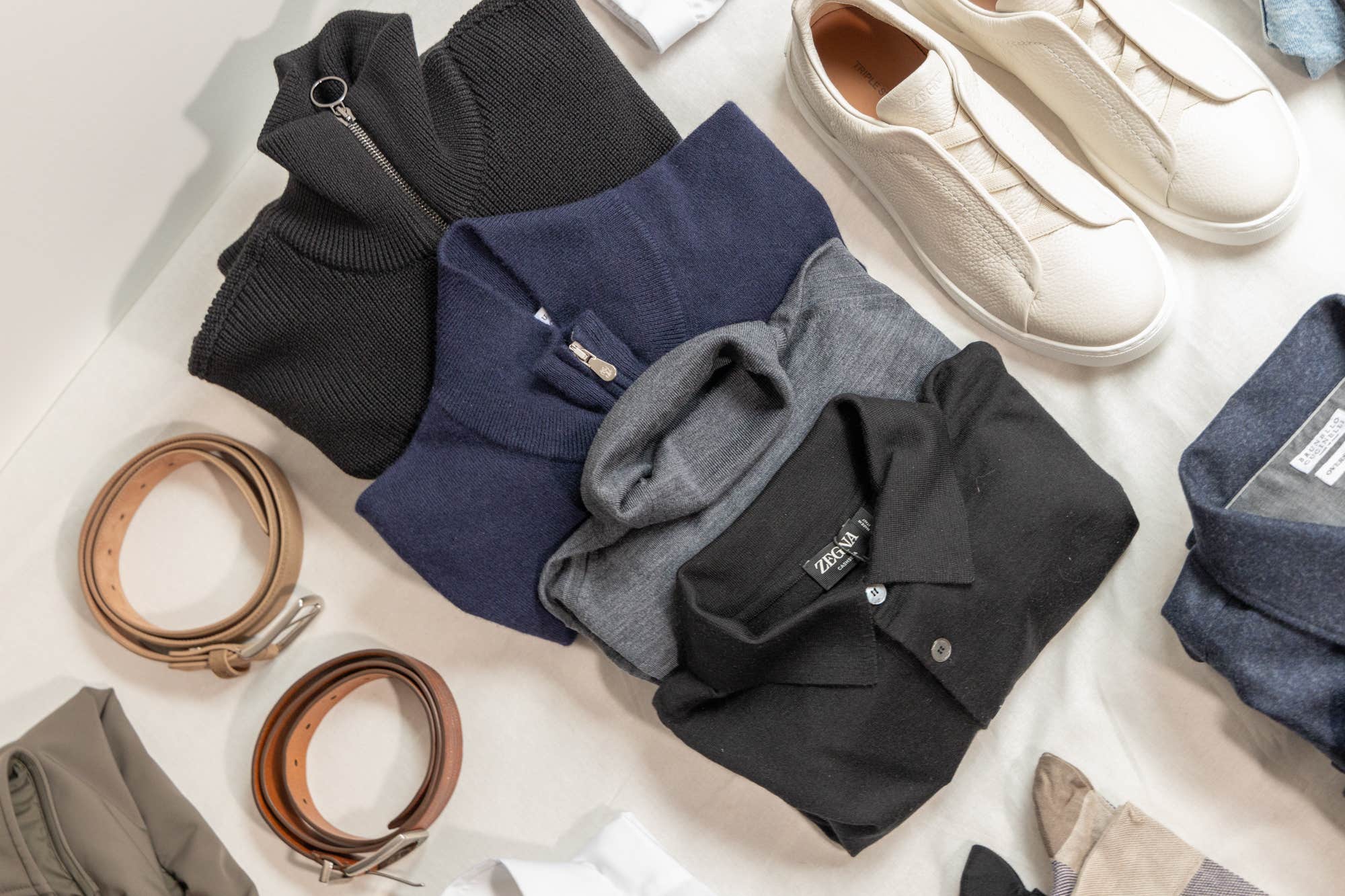

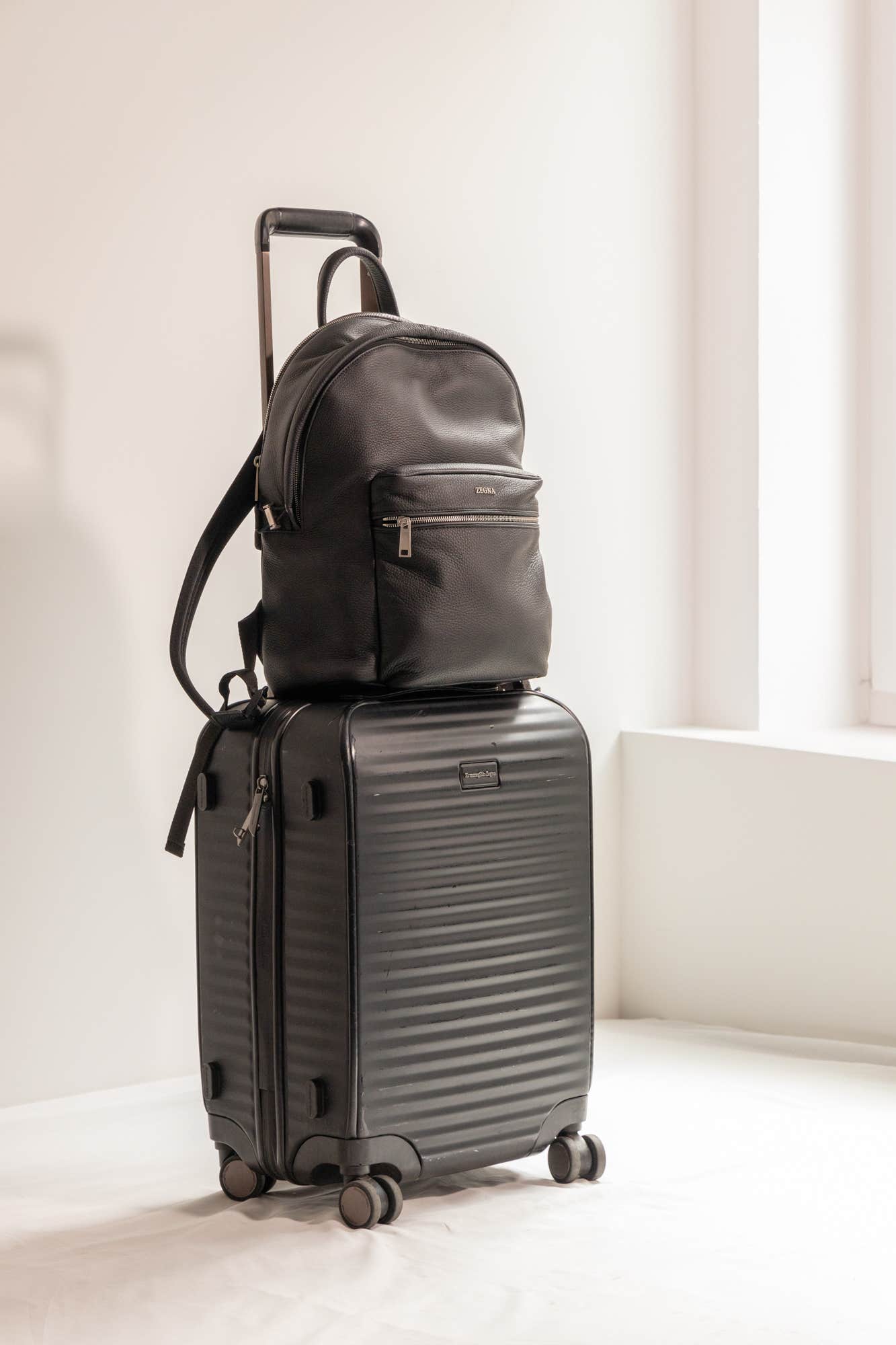

Chad’s go-to luggage setup is a carry-on roller bag and a backpack. Over the years, he’s found that a backpack is more efficient than a briefcase or side bag.
He wears his heaviest items on the plane to save room, like boots, heavy knitwear, and bulky outerwear.
Tip: Be sure to check for size restrictions, as European airlines usually require a smaller size than domestic airlines.
Chad’s go-to luggage setup is a carry-on roller bag and a backpack. Over the years, he’s found that a backpack is more efficient than a briefcase or side bag.
He wears his heaviest items on the plane to save room, like boots, heavy knitwear, and bulky outerwear.
Tip: Be sure to check for size restrictions, as European airlines usually require a smaller size than domestic airlines.
Now you’re ready to get everything into your bag. Here’s how Chad does it.
Shoes and Undergarments
Chad’s go-to, space-saving tip is to pack your socks and underwear inside your shoes. Roll them tight and push them as deep into the shoe as you can. Not only does this optimize space, it also acts as a shoe tree.
“Sneakers are for underwear, loafers are for socks.”
Tip: Shoes can also go into dust bags to protect the clothing from the footwear.
He packs his shoes before packing anything else, and lines them up along the edges at the bottom to create a corridor for the rest of the clothes. The heel of the shoes face upward to protect the toes from being crushed.
“Don’t be the fool with top-heavy luggage that keeps falling over in the airport. Make sure your shoes are at the bottom of your bag.”
Now you’re ready to get everything into your bag. Here’s how Chad does it.
Shoes and Undergarments
Chad’s go-to, space-saving tip is to pack your socks and underwear inside your shoes. Roll them tight and push them as deep into the shoe as you can. Not only does this optimize space, it also acts as a shoe tree.
“Sneakers are for underwear, loafers are for socks.”
Tip: Shoes can also go into dust bags to protect the clothing from the footwear.
He packs his shoes before packing anything else, and lines them up along the edges at the bottom to create a corridor for the rest of the clothes. The heel of the shoes face upward to protect the toes from being crushed.
“Don’t be the fool with top-heavy luggage that keeps falling over in the airport. Make sure your shoes are at the bottom of your bag.”
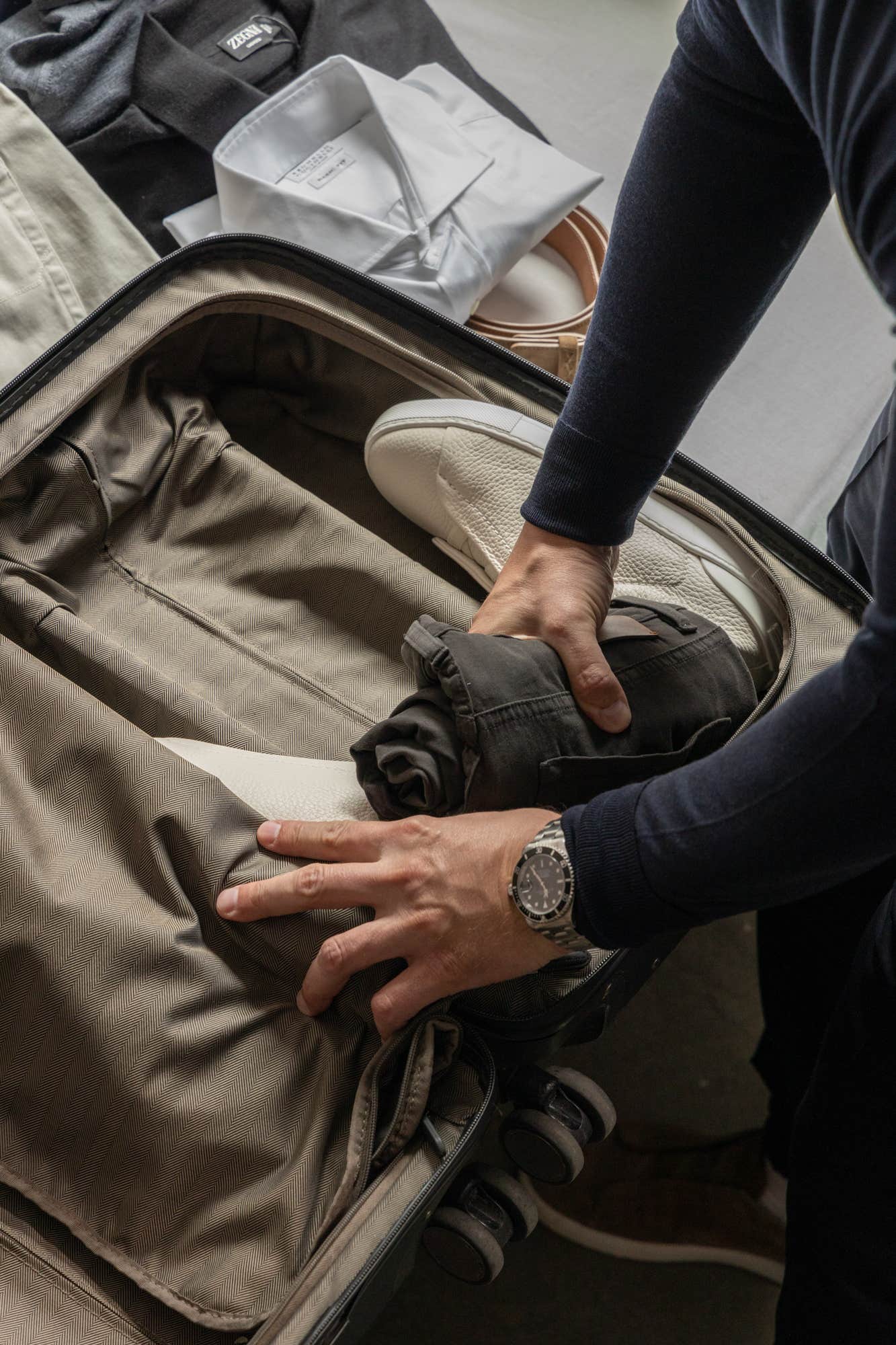

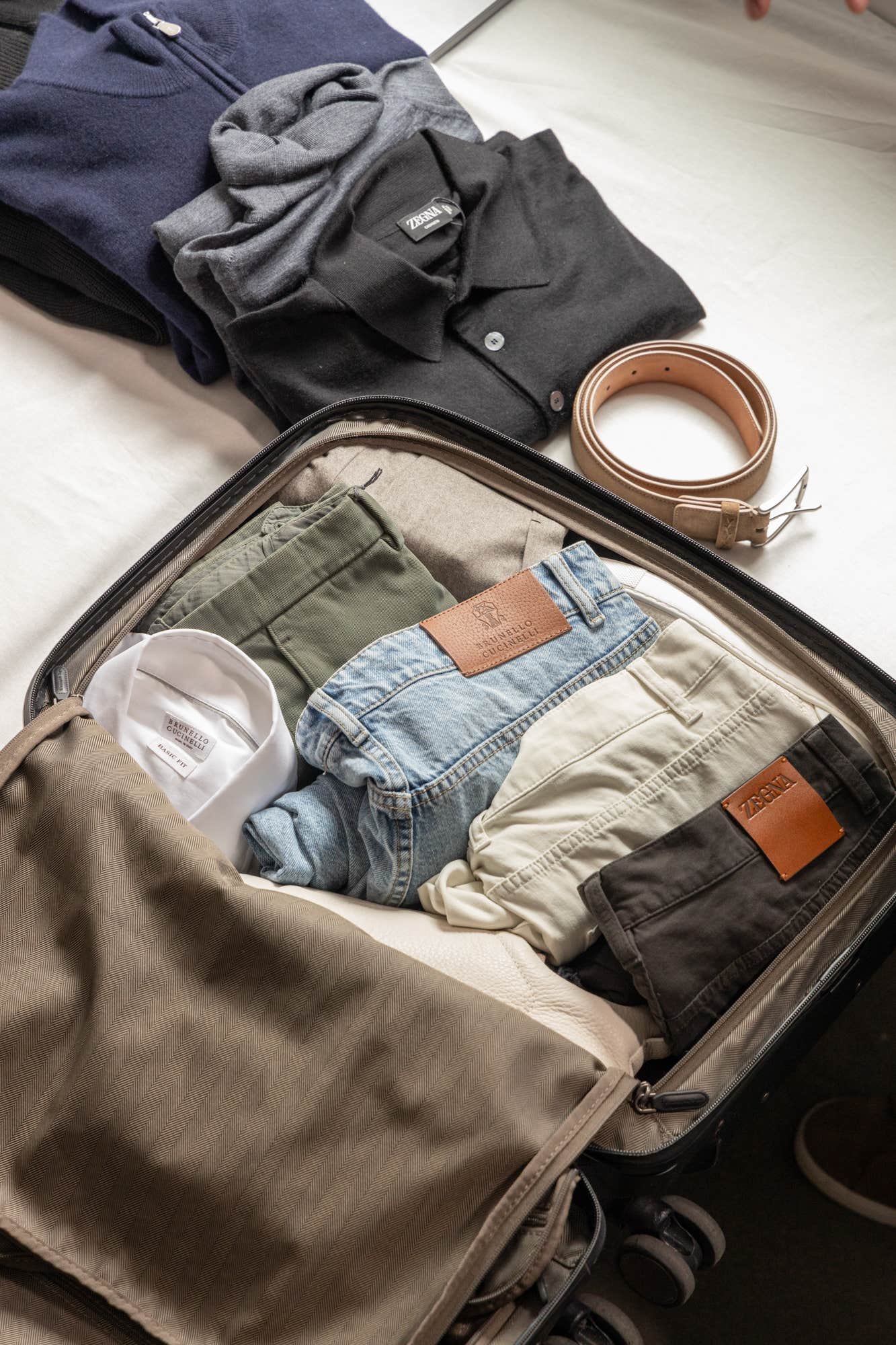
Bottoms
Next up are the bottoms. For all jeans, chinos, and dress pants, fold them in half with the crotch facing inwards, fold them in half once more, and roll them tight. Then tuck them in next to your shoes at the bottom of the bag, keeping light colours furthest away from the shoes.
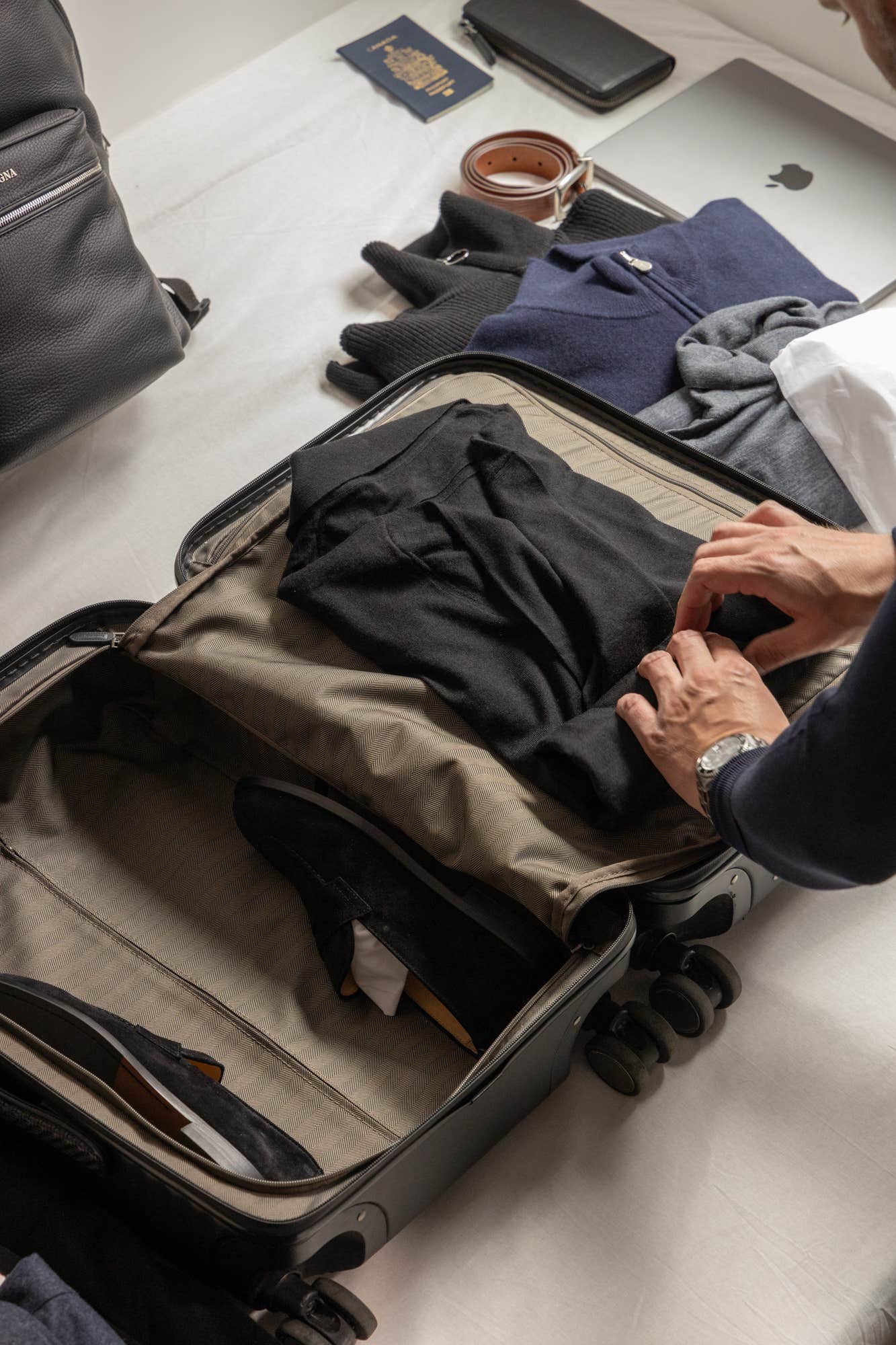
T-Shirts, Knits & Shirts
All shirts and knitwear should get rolled, folded tight and packed between the pants, working inwards toward the middle of the bag. For dress shirts, keep the collar flat at the top so it doesn't crease.
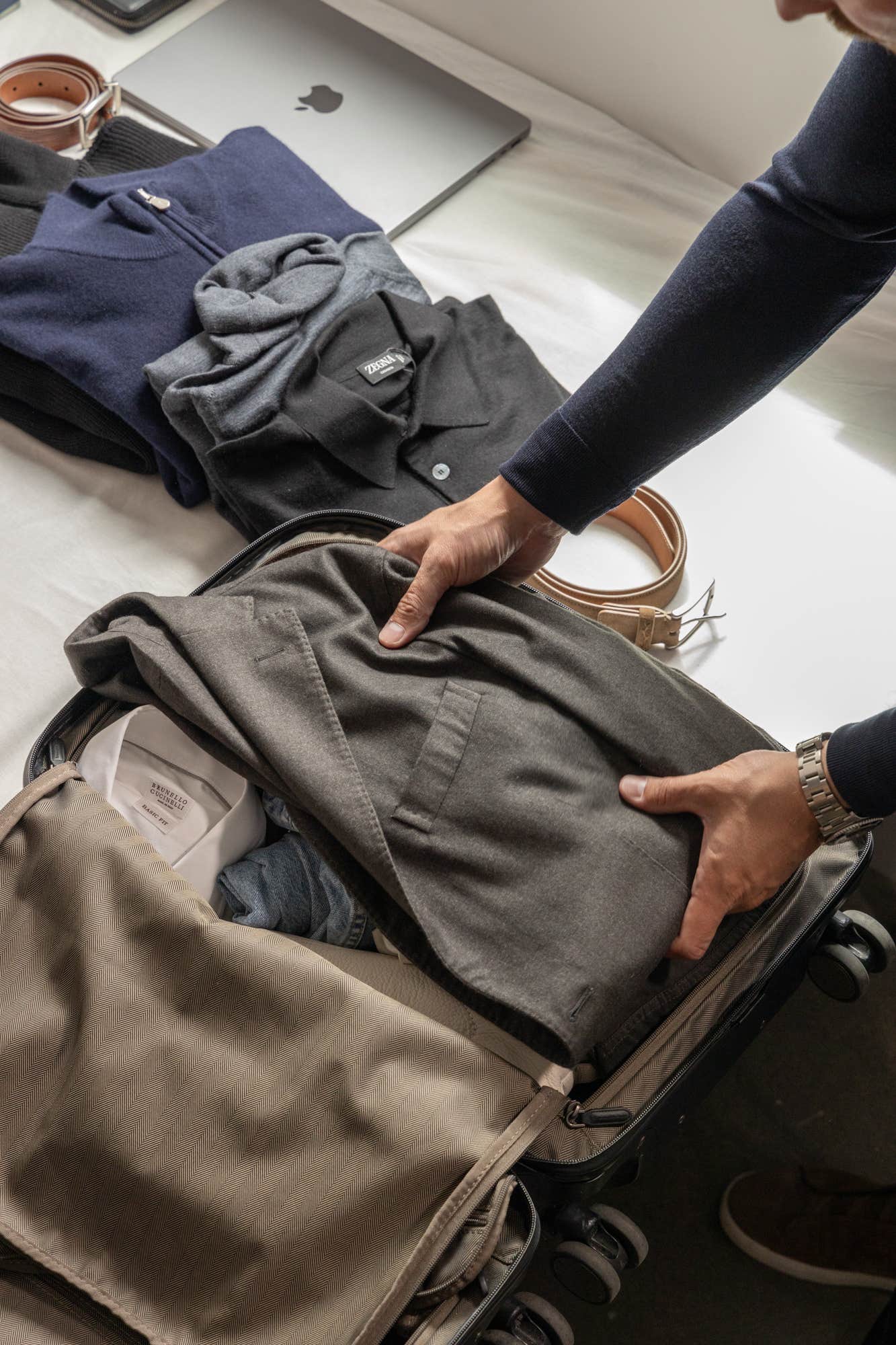
Blazers & Jackets
For blazers and jackets, tuck one shoulder into the other, keeping the shoulder pointed outwards to make sure the jacket looks symmetrical. Then fold them in half, and lay them on top of the rest of your clothing.
“You don’t have to do anything fancy when you pack blazers. Fold in half, then in half again”
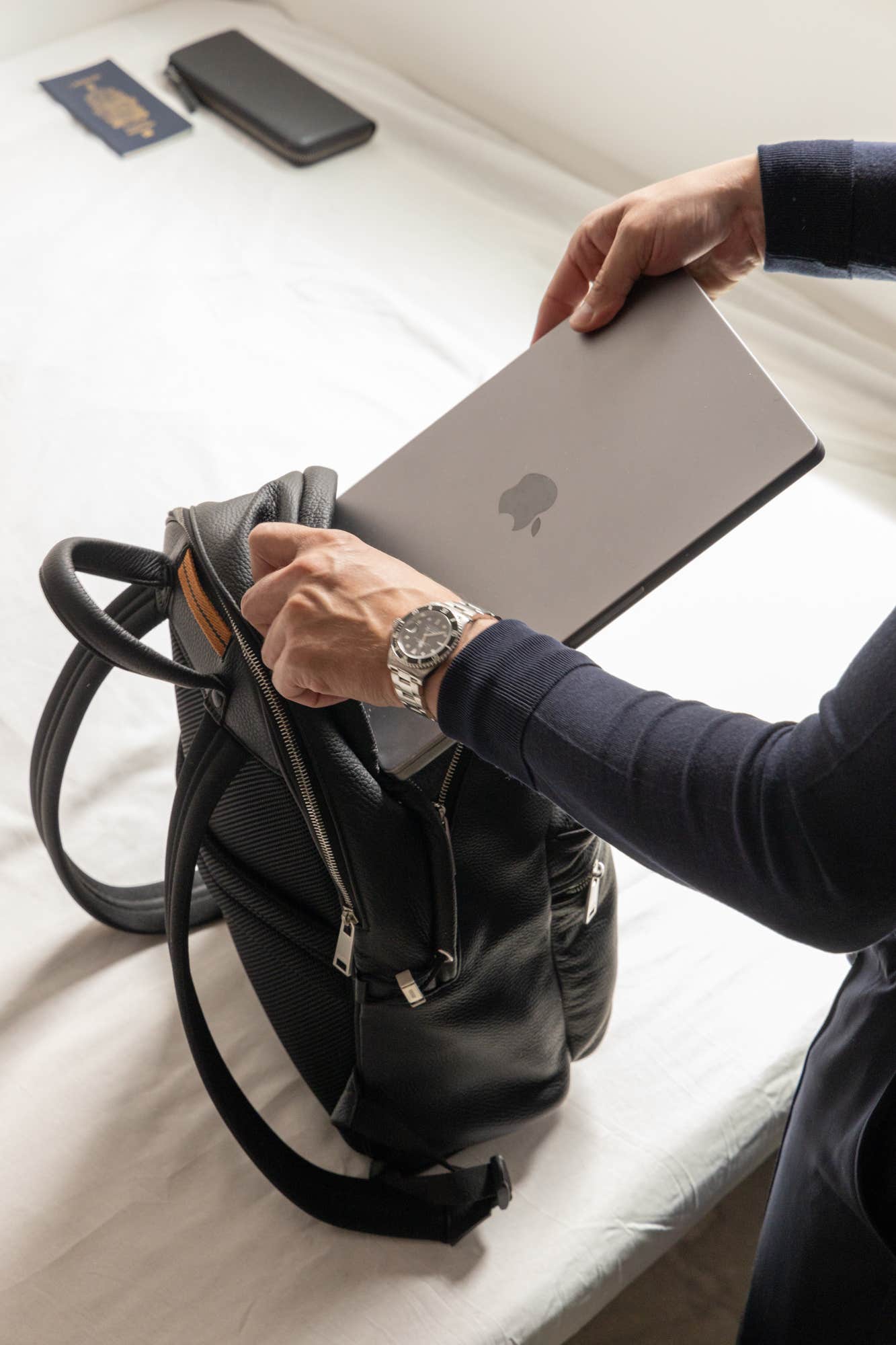

There are a few things Chad always saves for his backpack:
“I like a backpack for travel. It marries well with your roller, and functions great. This combo allows me the most flexibility and functionality with the baggage size allowance from the airlines.”
Chunky Sweater
If he isn’t wearing his heavy knitwear on the plane, he’ll roll it and place it at the bottom of the backpack. This is also convenient if the plane gets cold.
Technology, Toiletries, and Essentials
Everything he needs quick access to, either in the security lineup or on the plane, Chad packs near the top of his backpack–wallet, passport, laptop, chargers. And after a shampoo incident on a trip to Athens several years ago, he also makes sure all his liquids are safely stored in a plastic bag in his backpack, away from the clothing in his roller bag.
“Potential spilling aside, the last thing you want to have to do is tear apart your perfectly packed carry-on at the security lineup just to get to items you know you are going to place in a tray at security."
There are a few things Chad always saves for his backpack:
“I like a backpack for travel. It marries well with your roller, and functions great. This combo allows me the most flexibility and functionality with the baggage size allowance from the airlines.”
Chunky Sweater
If he isn’t wearing his heavy knitwear on the plane, he’ll roll it and place it at the bottom of the backpack. This is also convenient if the plane gets cold.
Technology, Toiletries, and Essentials
Everything he needs quick access to, either in the security lineup or on the plane, Chad packs near the top of his backpack–wallet, passport, laptop, chargers. And after a shampoo incident on a trip to Athens several years ago, he also makes sure all his liquids are safely stored in a plastic bag in his backpack, away from the clothing in his roller bag.
“Potential spilling aside, the last thing you want to have to do is tear apart your perfectly packed carry-on at the security lineup just to get to items you know you are going to place in a tray at security."
Just as important as his packing technique is Chad’s unpacking process upon arrival. Things have been packed so tightly, a bit of wrinkling is expected. Once he gets to the hotel, he orders an iron and ironing board to the room and starts to take out all his suits, trousers, outerwear, and anything else he plans to wear within the first few days.
“If you leave your tailored clothing in your bag, it’ll look like a wrinkled mess. Get it out right away and save yourself the hassle of needing to iron it later. Especially if you are coming from a humid environment.”
He’ll give a quick steam or press to any shirts or knitwear he’s planning to wear in the next couple days, and hang it or fold it so it’s ready to go.
Tip: Hang your pants on clip hangers, clipping at the bottom cuffs so the waistband hangs down. The weight of the pants will work the wrinkles out over the next day or so, saving you from needing to press them.
And that’s it: Chad’s method for packing 2 weeks’ of clothes without having to check a bag or sacrifice style. Not so hard, is it?
“People have strong opinions about how to pack, but it’s really not that complicated. With a bit of pre-planning and 15 minutes or so of maintenance when you arrive, you’ll have everything you need, and you won’t need to be the annoying one holding up the trip with your checked luggage.”
Just as important as his packing technique is Chad’s unpacking process upon arrival. Things have been packed so tightly, a bit of wrinkling is expected. Once he gets to the hotel, he orders an iron and ironing board to the room and starts to take out all his suits, trousers, outerwear, and anything else he plans to wear within the first few days.
“If you leave your tailored clothing in your bag, it’ll look like a wrinkled mess. Get it out right away and save yourself the hassle of needing to iron it later. Especially if you are coming from a humid environment.”
He’ll give a quick steam or press to any shirts or knitwear he’s planning to wear in the next couple days, and hang it or fold it so it’s ready to go.
Tip: Hang your pants on clip hangers, clipping at the bottom cuffs so the waistband hangs down. The weight of the pants will work the wrinkles out over the next day or so, saving you from needing to press them.
And that’s it: Chad’s method for packing 2 weeks’ of clothes without having to check a bag or sacrifice style. Not so hard, is it?
“People have strong opinions about how to pack, but it’s really not that complicated. With a bit of pre-planning and 15 minutes or so of maintenance when you arrive, you’ll have everything you need, and you won’t need to be the annoying one holding up the trip with your checked luggage.”
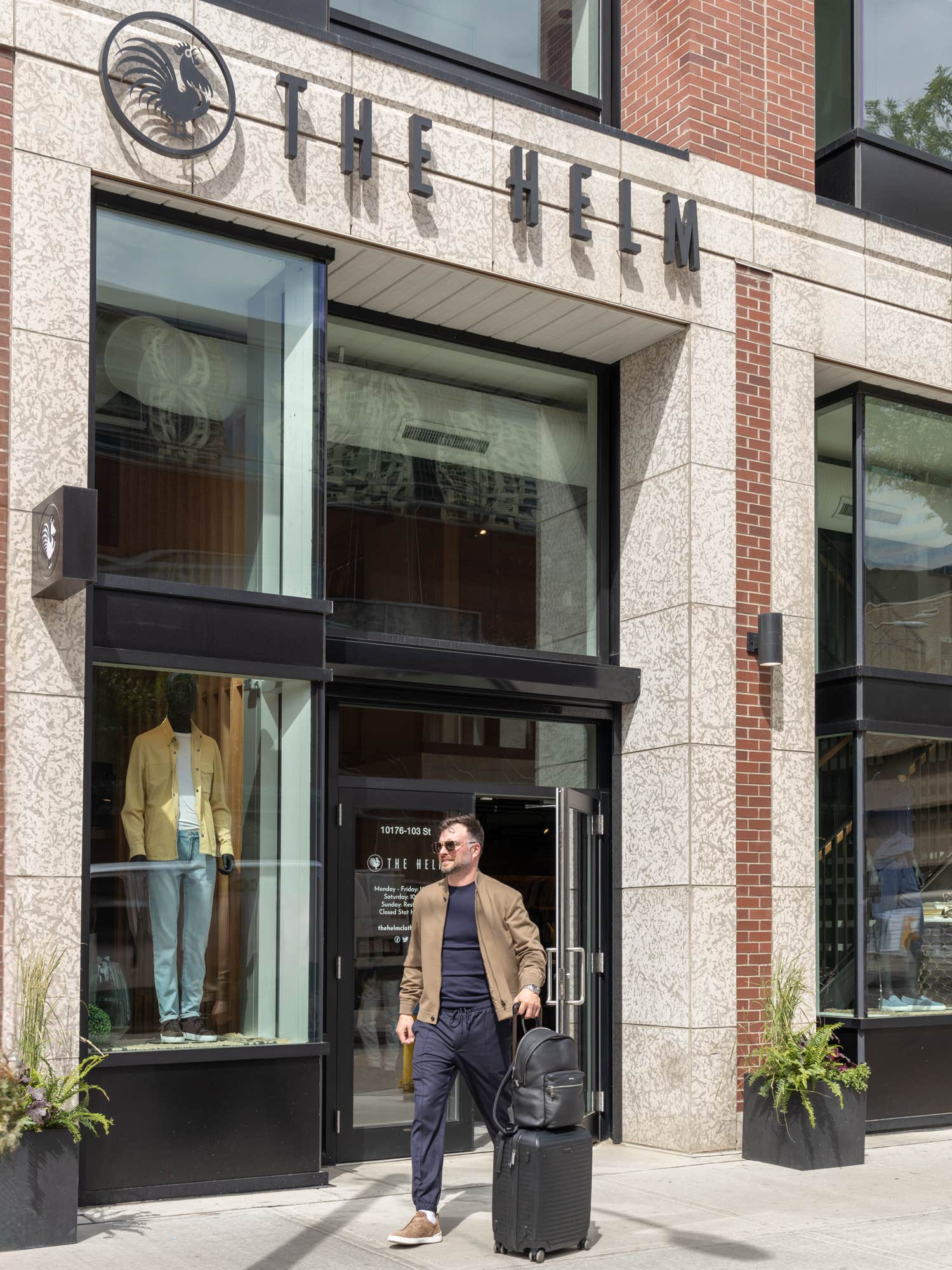

We understand that things don't always work out. We offer easy returns in-store or by mail.
Come see the product up close at our Flagship Store.
For local orders, in-store pickup is available for no cost.
Your clothing should always represent you well, whether you bought it yesterday or 5 years ago.
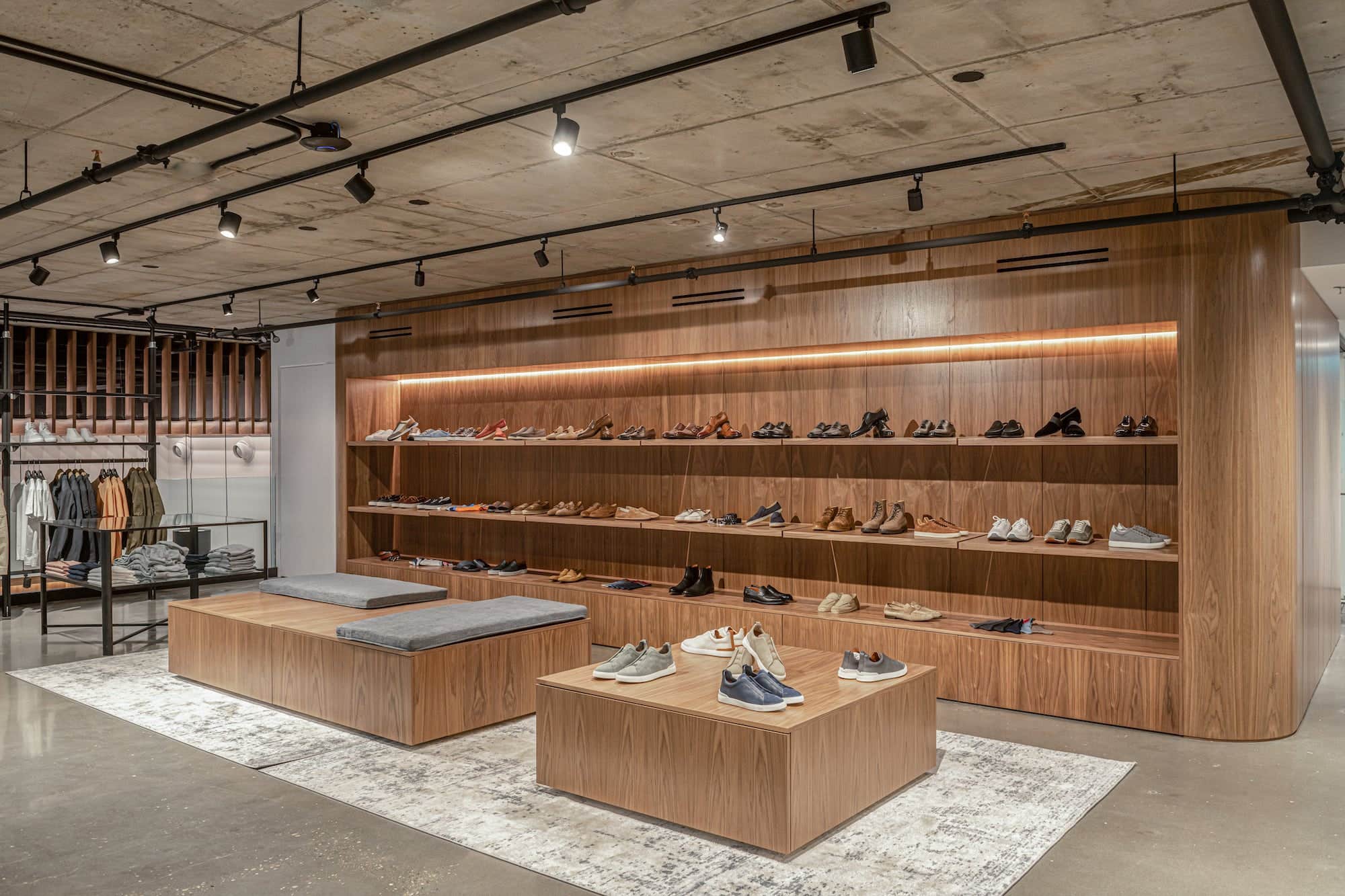
The Flagship
Our brand new flagship store in Edmonton, Alberta is now open to serve you! In our mission to provide Edmonton with an elevated experience, our vision for this store was something spanning multiple floors with a unique experience on every level.